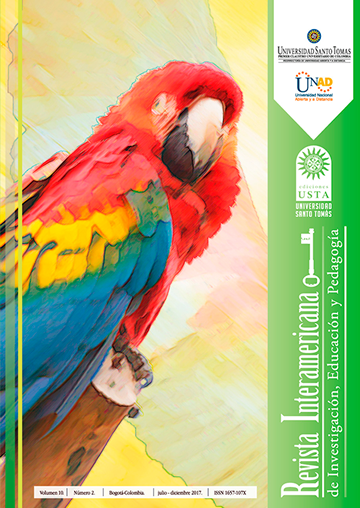La Argumentación Como Estrategia Que Potencie El Pensamiento Crítico En Los Estudiantes De Grado 5° Del Centro Educativo Castilleral
The Argumentation As A Strategy To Empower Critical Thinking In Students Of Fifth Grade At Centro Educative Castilleral
Abstract (en)
Argumentation is one of the characteristics of critical thinking, therefore, it is vitally important for its acquisition; due to its importance, several investigations have been conducted; however few studies have directly addressed the argumentative levels. That is the reason why this research seeks to analyze the argumentative levels in the critical thinking development in students of fifth grade at Centro Educativo Castilleral (EC) taking into consideration socially relevant problems. To this end, it intends to design and apply a UD, based on problem solving; to evaluate the argumentative levels of students at the beginning and at the end of application of a Didactic Unit (UD), establishing conceptual evolution and identifying the obstacles presented in the argumentation as a strategy to promote critical thinking. The fulfillment of these objectives will allow identifying the argumentative levels and the conceptual evolution of the students, when they face a problem socially alive; making use of the qualitative approach, specifically the case study design. The instruments used to collect the data are the followings: a pre and post-test of previous ideas and the application of a UD. The results present an emergent level(Level 0), which shows difficulty in the process of describing and interpreting, absence of the levels 3, 4 and 5 proposed by Erduran; Which refer to establish justifications, the use of qualifiers or theoretical support and counterarguments. Likewise, a conceptual change is evidenced, as there is a greater approach to scientific knowledge. On the other hand, there was a slight increase in the use of the conclusions (Level 2), which reflects progress in the argumentative levels. This leads to conclude that addressing socially relevant themes and the relevance in the research design (pre-UD-post) in the classroom, contribute to the conceptual evolution and advances in students' argumentative levels.Abstract (es)
References
Almeida Mejía, M. F. (2014). ridum.umanizales.edu.co. Obtenido de http://ridum.umanizales.edu.co:8080/xmlui/handle/6789/1727
Alvarez, O. D. (2013). Las unidades didácticas en la enseñanza de las Ciencias Naturales, Educación Ambiental y Pensamiento Lógico Matemático. Revistas.USB.EDU.CO, 4.
Candela, M. A. (1991). Argumentación y conocimiento cientifico escolar. Obtenido de centro de investigación y estudios avanzados.
Castaño, L. A. (2014). repositorio.utp.edu.co. Obtenido de https://www.google.com.co/webhp?sourceid=chrome instant&ion=1&espv=2&ie=UTF-8#q=%E2%80%9CAportes+d e+la+argumentaci%C3%B3n+en+la+constituci%C3%B3n+de+pensamiento+cr%C3%ADtico+en+el+dominio+especifico+de+la+qu%C3%ADmica%E2%80%9D
Curotto, M. d. (2008). La resolución de problemas como estrategia de enseñanza y aprendizaje. Revista Electrónica de Enseñanza de las Ciencias Vol. 7 Nº2 (2008) , 464.
Fernández Núñez, L. (2006). ¿Cómo analizar datos cualitativos. Obtenido de http://www.ub.edu/ice/recerca/pdf/ficha7-cast.pdf
HERNANDEZ BARACALDO, C. P. (2012). MAGDA Y CLARA PRODUCCIÓN DE TEXTO ARGUMENTATIVO.pdf.
Jorge Valenzuela, A. M. (2008). Motivación y Pensamiento Crítico: Aportes para el estudio de esta relación. Revista Electrónica de Motivación y Emoción, 3. Obtenido de http://reme.uji.es/articulos/numero28/article3/article3.pdf
Marciales, G. P. (2003). biblioteca.ucm.es. Obtenido de http://biblioteca.ucm.es/tesis/edu/ucm-t26704.pdf
PAGÈS, J. y. (2008). Cambios y continuidades: aprender la temporalidad histórica. Obtenido de PDF]PAGÈS, J./SANTISTEBAN, A. (2008). Cambios y continuidades ...
Ramirez, C. F. (2010). repositorio.autonoma.edu.co. Obtenido de http://repositorio.autonoma.edu.co/jspui/bitstream/11182/647 1/Tesis_Carlos_Fernando_Ramirez%5B1%5D.pdf
RIVERA, L. H. (2013). docplayer.es. Obtenido de http://docplayer.es/21023724-Ensenanza-aprendizaje-del concepto-de-ser-vivo-en-estudiantes-de-basica-primaria.html
Sonia Osses Bustingorry, S. J. (2008). METACOGNICION: UN CAMINO PARA APRENDER A APRENDER. scielo.cl. Tamayo. (2001).
Tamayo Alzate, Oscar Eugenio. (2011). La argumentación como constituyente del pensamiento crítico en niños. revista hagazgos No. 17. Bogotá: Universidad Santo Tomás. Obtenido de file:///C:/Users/Prof/Downloads/442-1708-1-PB.pdf
Tamayo, O. E. (2011). La argumentación como constituyente del pensamiento critico en niños. revistas.usta.edu.co , 220. Obtenido de http://revistas.usta.edu.co/index.php/ hallazgos/article/view/738/1018
How to Cite
License
- Regarding copyrights, once the article is accepted and published in the Journal of Inter-American Research, Education and Pedagogy-RIIEP, authors assign to the journal the economic rights, remaining moral rights in the author(s).






